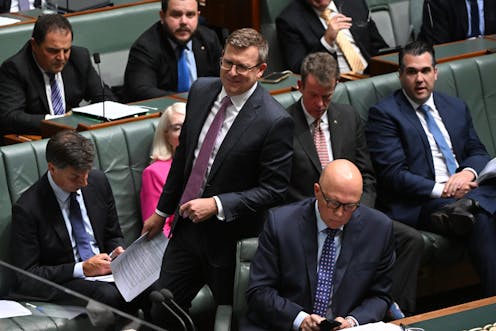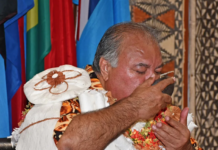Source: The Conversation (Au and NZ) – By Adrian Beaumont, Election Analyst (Psephologist) at The Conversation; and Honorary Associate, School of Mathematics and Statistics, The University of Melbourne

Mick Tsikas/AAP
On February 9, Liberal Alan Tudge announced he would resign from politics, setting up a byelection in his Victorian seat of Aston. A date for the byelection is still to be determined.
Former Liberal Treasurer Josh Frydenberg, who previously represented Kooyong (VIC) until his defeat by teal independent Monique Ryan at the 2022 election, has ruled himself out of contesting this byelection.
At the federal election, Tudge defeated Labor by 52.8-47.2, a 7.3% swing to Labor since 2019. With Labor still polling well above its national 2022 election two party result of 52.1-47.9, the 2.9% swing required for Labor to win Aston appears to be achievable.
However, The Poll Bludger says Labor’s record at byelections in opposition-held seats in its first year of government has been disappointing. There were six byelections during the first year of the Hawke Labor government, and Labor failed to make ground in any of them.
In 2007, the first year of the Rudd Labor government, the Nationals had a 6.1% swing in their favour at the Gippsland byelection. Both Hawke and Rudd were very popular at the time of these byelections, but Labor was unable to convert honeymoon polling into success at byelections.
Aston was first created with the expansion of parliament in 1984, and Labor won it in 1984 and 1987. The Liberals gained Aston in 1990 as the result of an anti-Labor swing in Victoria, and have held it comfortably since.
In the first two elections in Aston, it was more pro-Labor than Victoria overall – see the ABC graph. But the Liberals have performed better in Aston than in Victoria since 1990, with the gap a record 13.2 points in 2019, higher than 12.2 points in 2004. This gap shrank to 7.6 points in 2022 (Liberals at 52.8% in Aston and 45.2% in Victoria).
Analyst Kevin Bonham said a government has not gained a seat at a byelection since 1920, but governments do much worse in their own seats at byelections than in opposition seats owing to the loss of the previous MP’s personal vote. The average swing at opposition-held seats that both major parties contested is 1.2% to the opposition.
If Labor is still polling massive national leads when the byelection is held, they have a chance to win Aston. But Labor’s performance at byelections that were held early in the Hawke and Rudd governments implies the Liberals should retain the seat.
Essential poll: Greens gain before Thorpe’s defection
In the previous Essential poll that would have been conducted before Lidia Thorpe’s defection from the Greens on February 6, Labor led by 55-40 on Essential’s measure that includes undecided (53-42 previously). Primary votes were 33% Labor (down one), 30% Coalition (down one), 17% Greens (up three), 6% One Nation (down two), 9% for all Others (up one) and 5% undecided (steady).
Read more:
Lidia Thorpe’s defection from the Greens will make passing legislation harder for Labor
In other questions
from this poll of 1,000 people, voters supported the Indigenous Voice to parliament by 65-35 (63-37 in December). Greens voters supported the Voice by 89-11 and Labor votes by 77-23. Coalition votes were opposed by 59-41, while Others were narrowly in favour by 52-48.
Asked to describe conviction of vote, 38% said they were hard “yes”, 26% soft “yes”, 14% soft “no” and 21% hard “no”. By 37-30, voters said they did not feel well-informed about the Voice.
Respondents were asked to rate Albanese and Dutton on a scale from 0 to 10. Responses of 0-3 were counted as negative, 4-6 as neutral and 7-10 as positive. Albanese had a 47% positive, 22% negative rating (46-23 in late November), while Dutton’s ratings were 35% negative, 26% positive (33-28 previously).
By 55-18, voters were satisfied with their current overall level of happiness and by 41-20 they were satisfied with their job security. However, they were dissatisfied with their financial security by 39-38, dissatisfied with climate change and the environment by 44-23 and dissatisfied with housing affordability by 52-20.
Morgan poll: 56.5-43.5 to Labor
The weekly Morgan poll, conducted February 6-12, gave Labor a 56.5-43.5 lead, a two-point gain for the Coalition since the previous week. Labor is now three points below their mid-January peak of a 59.5-40.5 lead in this poll. Primary votes were 37% Labor, 33.5% Coalition, 12.5% Greens and 17% for all Others.
A drop in Morgan’s weekly consumer confidence gauge to the lowest level since April 2020 after the Reserve Bank increased interest rates probably explains Labor’s drop.
NSW Essential sub sample: Perrottet’s ratings improve
The New South Wales election will be held on March 25. In Essential’s NSW sub sample of at least 300, Liberal Premier Dominic Perrottet’s ratings were 51% approve, 33% disapprove (47-36 in late January). Labor leader Chris Minns was at 38% approve, 25% disapprove (38-27 previously).
![]()
Adrian Beaumont does not work for, consult, own shares in or receive funding from any company or organisation that would benefit from this article, and has disclosed no relevant affiliations beyond their academic appointment.
– ref. Liberals likely to win Aston byelection; Voice support increases in Essential poll – https://theconversation.com/liberals-likely-to-win-aston-byelection-voice-support-increases-in-essential-poll-199395







